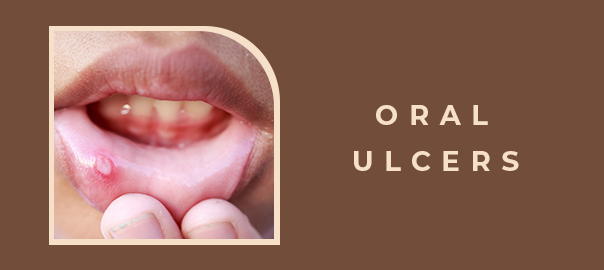
Oral Ulcers – Symptoms, Causes, Treatment
Oral ulcers, or canker sores, are painful oral problems that almost everyone has, or will have, experienced once in their lifetime. These small superficial ulcers may appear inside the mouth on the tongue, gums, or inner lining of the cheeks. Although these ulcers generally hold no dangerous implications, often times healing on their own, it will be beneficial to understand their symptoms, their causes, and ways of treatment to better alleviate the discomfort and accelerate the recovery processes appropriately.
Signs and Symptoms of Oral Ulcers
- 1. Painful sores amidst the mucous membrane, that is, the lining or “skin” inside the mouth including the cheeks and lips.
- 2. Swollen and tender area around the ulcer. One may have discomfort brushing and chewing because of the soreness.
- 3. Contact of ulcers with spicy, salty or acidic foods painful stimulation.
- 4. Irritation of ulcers with denture, orthodontic aligners and mouth guards.
Causes of Oral Ulcers
- 1. Minor Trauma: Minor trauma to the mouth is the most common cause that involves inadvertent biting and vigorous brushing of teeth.
- 2. Stress and Hormonal Changes: The incidence of oral ulcers is related to emotional stress and also to hormonal changes, especially in women at the time of menstruation, pregnancy, and menopause.
- 3. Dietary Factors: Some categories of food contain acid and spicy elements which may cause oral ulcers among those who happen to be sensitive to such categories.
- 4. Autoimmune Disorders: It has been estimated that celiac disease, Crohn’s disease, and Behçet’s disease have the potential to predispose these patients in the development of oral ulcers.
How Oral Ulcer Is Treated
- 1. Topical Medications: Over-the-counter oral gels and ointments active ingredients are benzocaine or hydrocortisone which help pain by numbing the area and reduce swelling.
- 2. Oral Rinses: Antimicrobial or saline oral rinsing keeps the mouth clean and free from infection to allow it to heal the ulcer faster.
- 3. Avoidance of appropriate food: Identification and avoidance of certain food which could be considered to potentially cause an oral ulcers and, therefore, can be prevented from occurring again, such as intake of acidic or spicy food.
- 4. Stress Management: The use of stress-reducing techniques, such as meditation, yoga or deep breathing exercises, may help alleviate ulcers caused by stress.
- 5. Professional Dental Care: Oral ulcers that don’t heal within a certain time or keep recurring or are accompanied by other disquieting signs and symptoms require professional advice by dentists or health professionals no matter what.
Conclusion:
Although oral ulcers may be temporary in nature, identifying the symptoms and finding and treating the possible causes of them goes a long way in recovery. Good oral hygiene, stress management techniques, and professional advice play a very important role in their management and prevention.
Persistent symptoms or those that are severe, please consult a dentist at your nearest Clove Dental clinic for personalized advice and care.
DISCLAIMER:Please note that the prices mentioned on this page: (a) present a range (depending upon the severity of the dental condition, the technology used in treatment, type of dental products used, etc.); (b) are true as on the date of this page and may change on a later date, in accordance with the standard company policy; (c) may be subject to standard aberrations or generalizations on account of the use of AI in general Google/internet search by you.Leave a Reply
Leave a Reply
Explore More Similar Posts
Explore More Blogs


Leave a Reply